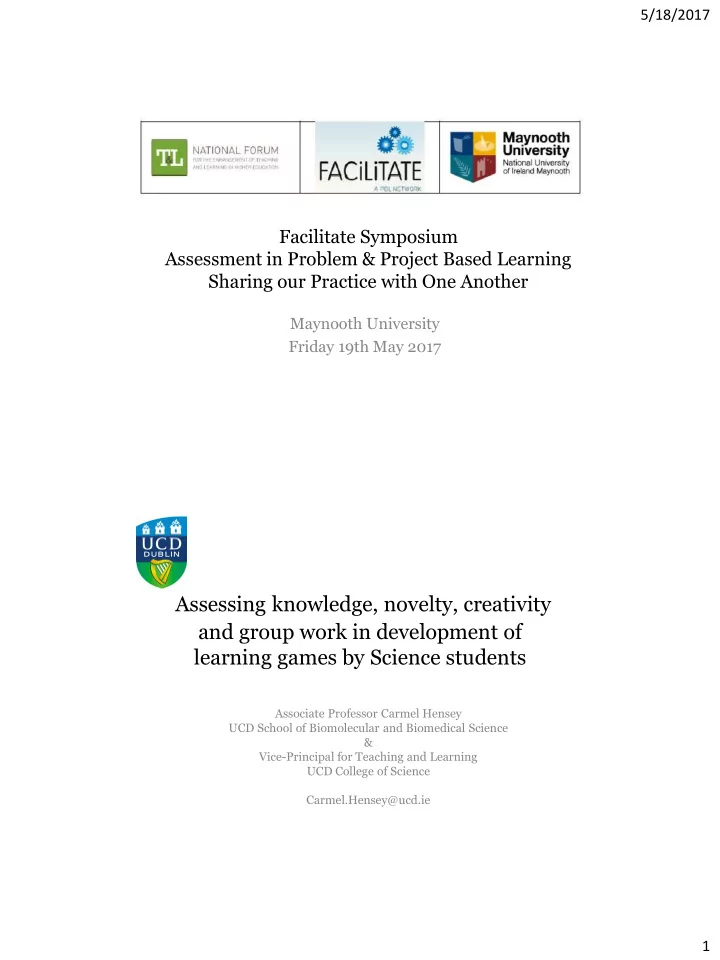

5/18/2017 Facilitate Symposium Assessment in Problem & Project Based Learning Sharing our Practice with One Another Maynooth University Friday 19th May 2017 Assessing knowledge, novelty, creativity and group work in development of learning games by Science students Associate Professor Carmel Hensey UCD School of Biomolecular and Biomedical Science & Vice-Principal for Teaching and Learning UCD College of Science Carmel.Hensey@ucd.ie 1
5/18/2017 3 rd year Science, Pharmacology • Redesign a core, traditionally delivered toxicology module of lectures and laboratory practicals – Assessment based on 5 practical reports (30%) and end of semester written exam (70%) • Reduce the number of lectures and practicals and replace with supervised project work sessions with all elements of the module being assessed during semester – Group project (30%) – Individual project (30%) – Practical reports x 3 (20%) – MCQ (20%) • The rational was to improve student engagement with the subject, promote deeper learning and peer learning. • Increasing social interaction and creating a more inclusive environment for international and mature students was another goal. Group Project: Design and Develop tools to teach toxicology to your peers • Each group is required to design a learning aid to teach the fundamentals of organ specific toxicology – Each group focuses on a different organ, e.g. heart, thus all aspects of organ based toxocity are covered across the class. • Be creative, you are free to work in any media – e.g. film, model, poster, wiki, app, podcast … ... • The learning aid should convey the key points regarding toxicity in a particular organ using at least 3 major toxins to demonsrtate toxic mechanisms in that organ. • On completion of this task the learning aids will be available for use by the whole class. – all students will use the available tools to learn about toxicity in different organs. 2
5/18/2017 • Students work in assigned groups of 4 to 6 in an active learning environment. • Games and other learning aids are developed in consultation with the lecturer. Games are popular…. Renal Pursuit Board Game- focus is on kidney toxicity TOX HOP- Board game- focus is on liver toxicity . 3
5/18/2017 Screen shots from Lung Tox playstation game Websites and digital media designed for use on smartphones or other mobile electronic devices. A website on kidney toxicology: http://toxicologyofthekidney.weebly.co m/ 4
5/18/2017 A wiki on blood toxicity: http://toxic-responses-in-the-blood.wikispaces.com/ • Includes different pages designed for visual learners, audiovisual learners and “table people”. Mnemonics and Rhymes were also created. Flash Cards and….. mannequins Assessment • Comprehension of topic- 30% • Identification of key concepts-30% – Clarity of Delivery – Level Appropriate to Stage 3 Pharmacology Enhancements to learning 30% • – Visual/auditory/interactive etc. – Novelty/Creativity – Rational for chosen methodology-submit a paragraph (max 250 words) • Reflection on group work-10% – submit a paragraph (max 200 words) on what went well and did not go well within the group. – What actions would you take to improve the group process? • Additionally, all aspects of organ based toxicity and lectures assessed by MCQ 5
5/18/2017 The benefits….. • Students were highly engaged and show more interest in the topic compared to the traditional delivery format. • Students welcome the freedom and opportunity for creativity. • Students develop many softer skills such as group work, writing and communication skills. • Promotes development of students ability to direct their own learning • Feedback is provided during the supervised project sessions and is thus timely, integrated and supports development. • Rich in informal feedback through peer review of project progress. • Attendance: 95-100% https://www.youtube.com/watch?v=veivW9sfVwM Student Feedback - the good… • Identify up to three aspects of the module that most helped your learning – “the group projects were great and a nice number to work with, the freedom in media and approach helped make us think creatively. I like the way the final exam is before the exam period to relive stress from other subjects ” – “The opportunity to choose a learning medium encouraged innovation and made the project more interesting” – “The concept behind doing the two projects was the most useful part of this project. Working in a group and dealing with arising problems was a great experience” “Doing the group project and learning from the other group projects” – – “ My group work did not only help me learning about my assigned organ, but also helped how to work within groups and gave me a better understanding of group dynamics ” 6
5/18/2017 a nd the bad….. • “Not personally a fan of group work, found it very stressful” • “More lectures” • “studying everyone's group project is quite difficult” • “Was hard to follow when we had lectures and when we didn't” 7
Recommend
More recommend